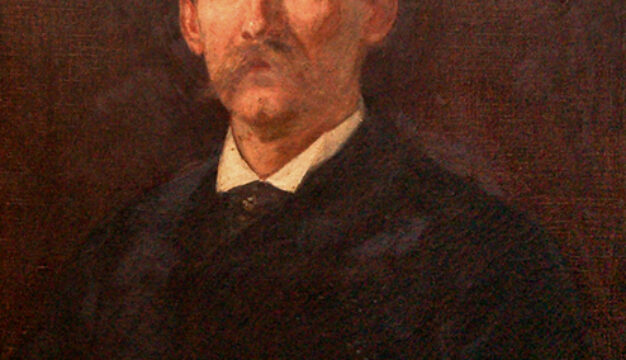W. E. B. Griffin
William Edmund Butterworth III (1929-2019), best known by pen name "W. E. B. Griffin," was a best-selling author who wrote or co-wrote more than 160 books of military, political, and detective fiction. Following his service in the Korean War, Griffin was stationed at Fort Rucker (now Fort Novosel), in Coffee and Dale Counties, where he began his writing career. His experiences and relationships from his time of service forms the basis for many of the characters in his novels in which he also incorporated historical and current events as backdrops for his narratives.
Griffin was born in Newark, New Jersey, on November 10, 1929, to William Edmund and Gladys (Schnable) Butterworth; the family also lived in New York City and Philadelphia. After getting expelled from school in 1946, Griffin enlisted in the U.S. Army at the age of 16. He was attached to the Allied occupation force in Germany, serving in the German Constabulary. In 1947, after completing his active-duty military service, Griffin enrolled at the Philipps Universitat Marburg in Marburg, Germany, to study political science. In 1950, he met and married Emma Josefa Macalik, with whom he would have three children.
Before he could complete his degree, Griffin was drafted into the U.S. Army following the outbreak of the Korean War in 1951. Serving initially as an Army war correspondent attached to the 223rd Infantry Regiment, he then became the Public Information Officer for the U.S. X Corps, which included the First Marine Division. The X Corps saw service at the Battles of Inchon and the Chosin Reservoir, and Griffin would later receive the Combat Infantryman Badge for his participation. After the cessation of hostilities in 1953, Griffin was honorably discharged from the Army (he would achieve the rank of sergeant) and was hired as a civilian by the Army as the Chief of the Publications Division of the Signal Aviation Test and Support Activity at Fort Rucker in Alabama.
While working for the military in 1961, Griffin published his debut novel Comfort Me With Love. He followed it with Hot Seat and The Love-Go-Round, all of which proved to be highly successful. Leaving his job to become a full-time writer, Griffin moved to Fairhope, Baldwin County, and began writing books for young adults as well as satire, military, political, and detective fiction. In 1994, he married Maria del Pilar Menendez, whom he met on a duck-hunting trip in Argentina. (He had divorced his first wife some time earlier.) Her father, a former colonel in the Argentine military, has been used as a source of Argentine and Argentine-American characters in several of Griffin's novels.
During his long career, Griffin wrote under 12 different pen names or pseudonyms. The origin of these pen names came about in the 1960s and 1970s, when he was writing three or four books per year. Because libraries were big purchasers with limited budgets, he used pseudonyms because he believed that if librarians saw a second or third book with his legal name on it in a given year they would think they had already bought the book. His most famous pen name, W. E. B. Griffin, arose in the early 1980s. In 1982, he had published the serious novel The Lieutenants as well as 11 novelizations of the television series M*A*S*H under his own name. Realizing that he would be publishing sequels to The Lieutenants in what would become his "Brotherhood of War" series, he decided to use the name W. E. B. Griffin because he did not want readers to buy his serious novels expecting works of satire, like the M*A*S*H books. Unlike most of his other pen names, which were made from family names, he came up with "Griffin" as a reference to the gryphon—a mythical creature with the wings of an eagle and the hindquarters of a lion—because he believed that is how most colonels think of themselves.
In addition to war and crime novels, Griffin also wrote books for younger audiences. Most of his children's books were written early in his career and under the pseudonym of James McM. Douglas or Patrick J. Williams. Griffin also published numerous romance novels under the pen name Eden Hughes and Allison Mitchell. In the early twenty-first century, he co-authored books with his son William E. Butterworth IV.
Griffin's novels follow a number of similar themes. In his military works, he emphasized the theme of a young man entering military life from a background of wealth and privilege. After performing foolish acts, the young man is saved by acts of heroism that transform him into an adult. Griffin avoided painting vivid battlefield scenes in favor of focusing the action on conflict between characters in social or military settings, such as when planning for combat. Although female characters are not central in his novels, Griffin nonetheless emphasized them as strong, resourceful, and clever.
Most of Griffin's books were written in series. His nine-volume "Brotherhood of War" series centers on the lives of U.S. Army officers from the end of World War II through the Vietnam War. "The Corps" series chronicles the exploits of U.S. Marines from the beginning of World War II to the middle of the Korean War. The "Honor Bound" series addresses Office of Strategic Service (the forerunner of the Central Intelligence Agency) agents stationed in neutral Argentina during World War II tasked with sabotaging German attempts to bring Argentina into the Axis fold. The "Presidential Agent" series deals with counterterrorism in the wake of the September 11, 2001, terrorist attacks and the rise of the highly centralized and dictatorial Russia under Vladimir Putin.
Griffin was one of the most prolific American authors of all time. He received numerous awards, including the American Library Association's Best Books for Young Adults list in 1980, the Alabama Author Award for LeRoy and the Old Man in 1982, and the 1995 Brigadier General Robert L. Dening Memorial Distinguished Service Award from the U.S. Marine Corps Combat Correspondents Association. He was inducted into the Alabama Academy of Distinguished Authors in 1982 and was awarded honorary doctorates by Norwich University in Vermont and Troy University, Pike County. In addition, Griffin was invested into the orders of St. George of the U.S. Armor Association and St. Michael of the Army Aviation Association of America, and was a life member of the U.S. Special Operations Association. Griffin also cofounded the William E. Colby Seminar on Intelligence, Military, and Diplomatic Affairs at Norwich University. His books have been printed more than 50 million time and in numerous languages and have been on New York Times, Wall Street Journal, and Publishers Weekly best seller lists. Griffin died on February 12, 2019, in Daphne, Baldwin County.






